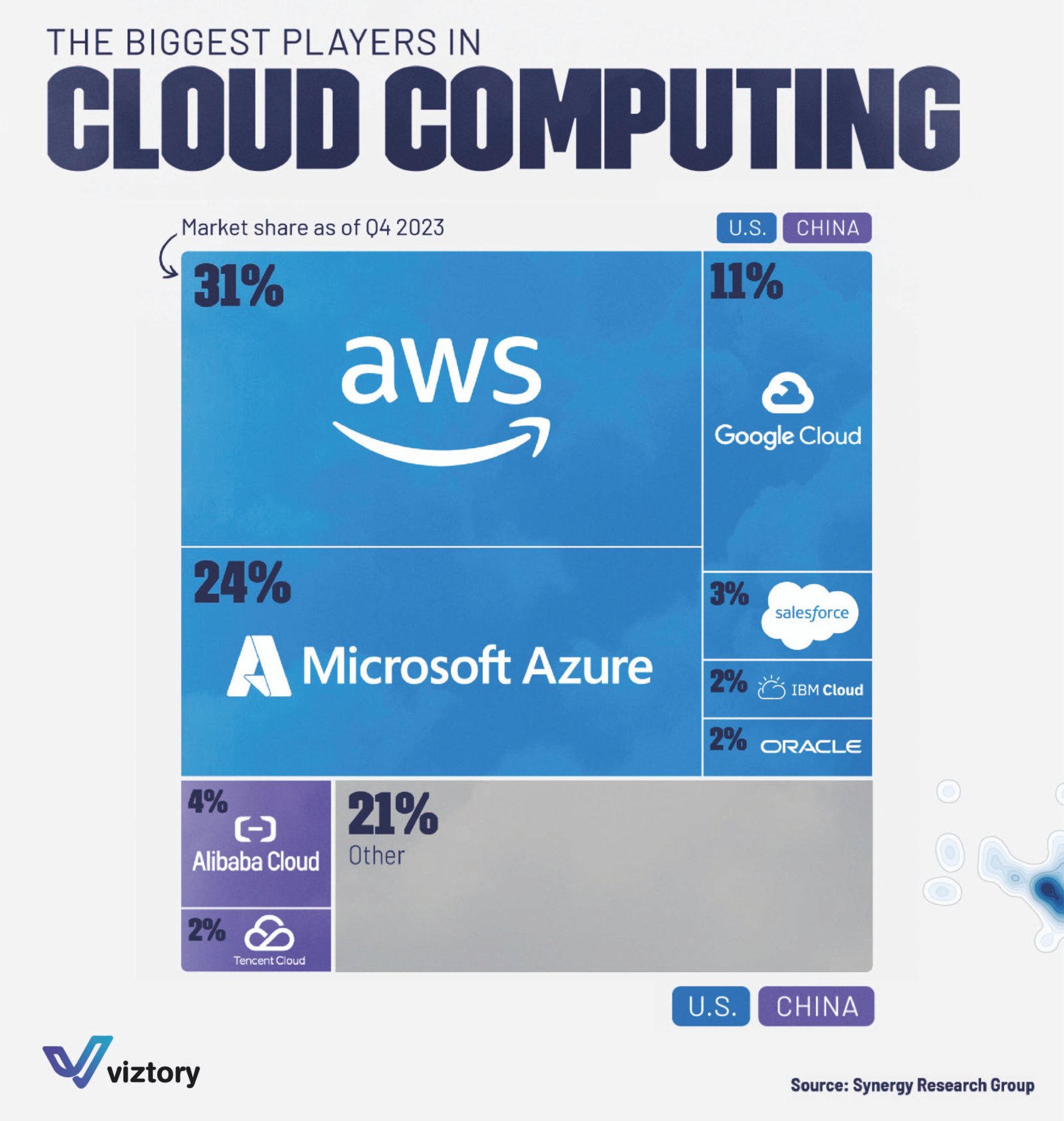The Giants of Cloud Computing: A Marketing Perspective
-
Aug, Thu, 2024
The Giants of Cloud Computing: A Marketing Perspective
Cloud computing has transformed the way businesses operate, enabling scalable, flexible, and cost-effective solutions for companies of all sizes. The landscape of cloud service providers is dominated by a few key players, each vying for a larger share of the market. As of Q4 2023, the leading players in this industry are Amazon Web Services (AWS), Microsoft Azure, Google Cloud, Alibaba Cloud, and others, as depicted in the infographic.
Market Share Overview
The infographic highlights the market share distribution among the top cloud service providers:
- Amazon Web Services (AWS) leads the market with a commanding 31% share.
- Microsoft Azure follows with 24%, solidifying its position as a strong competitor.
- Google Cloud holds an 11% share, focusing on specific niche services and integrations.
- Alibaba Cloud and Tencent Cloud, both based in China, capture 4% and 2% of the market, respectively.
- Other notable players, including Salesforce, IBM Cloud, and Oracle, contribute to smaller portions of the market.
The Role of Cloud Computing in Marketing
Cloud computing plays a critical role in modern marketing strategies, offering robust platforms for data management, customer engagement, and analytics. Here’s how these cloud giants influence marketing:
1. Data-Driven Marketing
- AWS and Azure provide powerful data storage and analytics tools that allow businesses to harness big data. Marketers can leverage this data to gain insights into customer behavior, personalize campaigns, and optimize marketing spend.
2. Customer Relationship Management (CRM)
- Salesforce, with its 3% market share, is renowned for its CRM solutions, which are essential for managing customer interactions and improving customer satisfaction. By integrating CRM systems with cloud platforms like AWS or Azure, companies can enhance their marketing automation and customer engagement efforts.
3. Scalability and Flexibility
- Cloud services offer the ability to scale marketing campaigns quickly. For instance, during high-demand periods, such as Black Friday sales, companies can increase their cloud resources to handle the surge in web traffic, ensuring a seamless customer experience.
4. Global Reach and Localization
- Alibaba Cloud and Tencent Cloud are crucial for businesses looking to expand into the Chinese market. These providers offer localized services that comply with Chinese regulations, making them indispensable for international marketing strategies targeting Chinese consumers.
5. Innovative Marketing Technologies
- Google Cloud is at the forefront of integrating artificial intelligence (AI) and machine learning (ML) into marketing strategies. These technologies enable predictive analytics, which can anticipate customer needs and tailor marketing messages accordingly.
Strategic Marketing Implications
For marketers, understanding the strengths of each cloud provider can inform better decision-making when selecting a platform for their needs. For instance:
- AWS is ideal for businesses that require extensive global infrastructure and a wide range of services.
- Microsoft Azure appeals to companies already invested in Microsoft products, offering seamless integration with Office 365 and other Microsoft services.
- Google Cloud is suited for businesses focused on AI, machine learning, and data analytics.
- Alibaba Cloud and Tencent Cloud are essential for those targeting the Asian market, particularly China.
Conclusion
The cloud computing market is a dynamic and competitive space dominated by a few key players. Each provider offers unique advantages that can be leveraged for different marketing strategies. As cloud technology continues to evolve, marketers must stay informed about the capabilities and market positions of these providers to make strategic decisions that will drive business growth and customer engagement.

